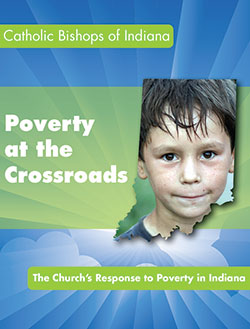Pastoral letter planted seeds for reducing the effects of poverty

By John Shaughnessy
During his four years as archbishop of Indianapolis, Cardinal Joseph W. Tobin made reducing the effects of poverty in Indiana a priority.
 That emphasis was set forth in “Poverty at the Crossroads: The Church’s Response to Poverty in Indiana,” a pastoral letter that was signed in 2015 by the five Catholic bishops in the state: Archbishop Tobin, Lafayette Bishop Timothy
L. Doherty, Gary Bishop Donald J. Hying, Fort Wayne-South Bend Bishop Kevin
C. Rhoades and Evansville Bishop Charles C. Thompson.
That emphasis was set forth in “Poverty at the Crossroads: The Church’s Response to Poverty in Indiana,” a pastoral letter that was signed in 2015 by the five Catholic bishops in the state: Archbishop Tobin, Lafayette Bishop Timothy
L. Doherty, Gary Bishop Donald J. Hying, Fort Wayne-South Bend Bishop Kevin
C. Rhoades and Evansville Bishop Charles C. Thompson.
The pastoral letter also invited and challenged Indiana residents to make the needs of the poor a priority, and to take action to reduce the effects of poverty.
“Using the simple formula of SEE, JUDGE, ACT, we invite and challenge everyone, beginning with ourselves, to be more attentive to the poor in our communities, to identify the systemic issues that keep individuals and families poor, and to take concrete steps to reduce the long-term impact of poverty in our state, even as we reach out and help those who, here and now, suffer from its devastating effects,” the bishops wrote.
A record 1,015,127 Indiana residents are living in poverty (at or below 100 percent of the federal poverty level), according to The Status of Working Families in Indiana, 2015 Report by the Indiana Institute for Working Families.
In one of a series of weekly columns in The Criterion in 2015 about this issue, Cardinal Tobin noted that the pastoral letter “contains no simple answers or magic formulas for eliminating poverty.” Still, he said, steps can be made to reduce the impact of poverty on people’s lives.
“The first step is to see the poverty that exists in our communities, in the urban, rural, suburban and small-town neighborhoods that make up the state of Indiana. The refusal to recognize poverty or to take it seriously is as old as humanity itself. If we let ourselves, we can easily ignore the poor. Worse, we can come to regard the plight of the hungry, homeless, unemployed, chronically ill and uneducated as ‘normal.’
“Seeing with our eyes is the first step, but it is essential that we also ‘see’ poverty with our hearts. Jesus was moved to compassion by the sight of the poor. His heart was filled to overflowing by the pain of others.”
In March of 2016, the archdiocese hosted a poverty summit in Indianapolis, inviting about 60 central Indiana business leaders to discuss concrete ways to help people out of poverty.
After the summit, Archbishop Tobin praised the contributions of all the leaders from business, education and health care who attended.
“The number and caliber of the participants make clear that the pastoral letter aroused some interest,” the archbishop said. “Some practical efficient models were shared that illustrated not only how people can make their first steps out of poverty through meaningful employment, but how employers can take steps to ensure that the poor will not return to misery.”
He viewed the summit as another positive step in addressing the challenge of poverty in Indiana.
“I shared with the other Catholic bishops of Indiana the positive experience at the meeting,” Archbishop Tobin noted. “They in turn informed me about similar efforts happening in their dioceses. I think the ‘conversation’ the bishops called for when we published ‘Poverty at the Crossroads’ a year ago is now taking shape. There is clearly a desire to continue the conversation in favor of concrete action and partnerships.” †

 That emphasis was set forth in
That emphasis was set forth in